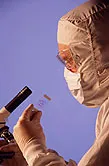'Markers' in blood, tissue might help determine best treatment for each patient, studies suggest
WebMD News from HealthDay

By Dennis Thompson
HealthDay Reporter
MONDAY, Oct. 28 (HealthDay News) -- Doctors believe they have found telltale signs that can indicate whether breast or prostate malignancies will remain dormant or develop into aggressive cancers.
These indicators -- called "biomarkers" -- are found in the blood or tissues of people with breast or prostate cancer. Researchers hope to one day use them to develop tests that will determine the cancer treatment each patient will need.
"It's a dream, I would say, at the moment. And it's a hope," Dr. Clifford Hudis, president of the American Society of Clinical Oncology (ASCO), said of the potential for using biomarkers to help determine a person's risk of aggressive cancer. "But it's not yet clinically validated, and it's not useful yet for patients."
Two research teams are scheduled to present their findings on possible biomarkers for breast and prostate cancer this week at the International Conference on Frontiers in Cancer Prevention Research, hosted by the American Association for Cancer Research, at the National Harbor in Oxon Hill, Md.
Doctors with the University of Pennsylvania reported that the presence of a protein called Vav2 in breast tissue might indicate whether a precancerous condition called ductal carcinoma in situ, or DCIS, will develop into invasive breast cancer.
Meanwhile, Johns Hopkins researchers said chromosomes in a man's blood might provide evidence that a prostate cancer will develop in an aggressive manner.
There is widespread concern that in both DCIS and prostate cancer, doctors tend to overtreat patients.
Two-thirds of DCIS cases never progress to full-fledged invasive cancer, ASCO's Hudis said, "which means when we treat DCIS, we are treating many people who would never have developed invasive cancer."
And few men with prostate cancer actually die as a result of the cancer, which has prompted much debate over whether doctors should treat it, said William Phelps, program director for the American Cancer Society. The available treatments often lead to unpleasant side effects such as incontinence and impotence.
"The treatments themselves are not very good," Phelps said of prostate cancer. "If the treatments were fairly nondamaging, you'd just say, 'Well, let's treat everybody.'"
The Pennsylvania researchers examined 211 remnants of tissue samples that had been taken to diagnose breast cancer. Of the samples, 42 were normal breast tissue, 71 were DCIS and 98 were invasive breast cancers.
DCIS involves the presence of abnormal cells inside a milk duct in the breast. In "pure" DCIS, the cells have not become cancerous and started to spread, said senior research investigator Marina Guvakova, an adjunct assistant professor in the department of surgery at the University of Pennsylvania.
However, there also are forms of DCIS that involve either fully invasive cancer or micro-invasive cancer, in which fewer than 10 percent of the abnormal cells have spread beyond the original tumor.
source : New Hope for Breast, Prostate Cancer Testing








